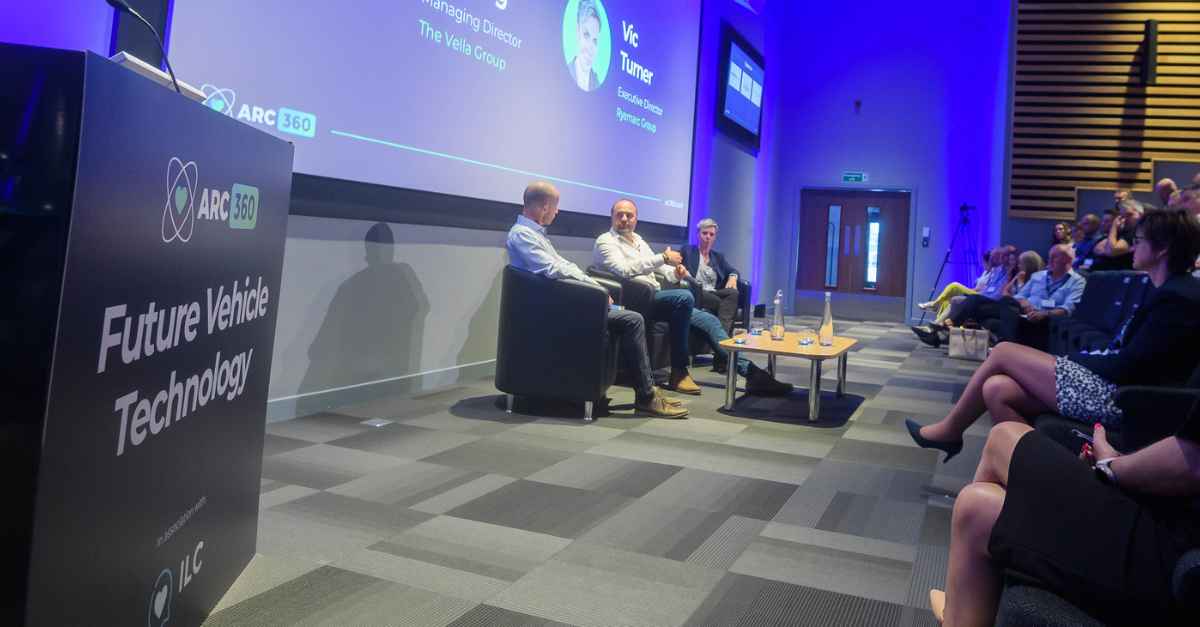As consolidation of the sector continues apace, some of the secrets to a successful strategy of acquisition were revealed during a session entitled ‘The changing landscape of repair operations’, held at ARC360’s Future Vehicle Technology themed conference.
Sharing the stage were Marc Holding, Managing Director, The Vella Group; and Victoria Turner, Executive Director, Ryemarc Group.
Marc explained how the Vella Group has expanded from five sites to 15 in just three years by shifting focus from new builds back to acquisitions.
He said, “Some repairers have unique operating models that would suit a new-build strategy more than an acquisition strategy. We try to keep our business model simple which allows us to have a two-pronged approach. But often the market dictates which way to go and if you do a new-build you have to attract staff and work. Those things are a bit of challenge at the moment so we looked at acquisitions instead.”
Victoria said that Ryemarc has also gone down the acquisition route, but said expansion is no longer simply about getting bigger.
She explained, “We have a very fixed, clear operating model and that makes it easy to make an acquisition rather than a build, but we have to find acquisitions we can add value to. It’s not just about footprint growth now. You don’t make acquisitions purely for scale in this environment. Instead they will be driven by skillsets and geographical reasons.”
Valuations
However, this year has posed specific challenges around acquisitions. Many bodyshops enjoyed their best ever year in 2023. This has seen many raise their valuations. In some cases they have priced themselves out of the market and both Marc and Victoria said that for every successful acquisition there are many others that do not get off the ground.
Marc said, “For every one that gets legs, there are eight or nine that fall down. A lot of bodyshops had their best ever year last year and are basing their valuations on that and they’re maybe a little on the high end.”
Victoria agreed, “Last year was a great year for bodyshops and valuations, but this year frequencies have dropped off a cliff. Those numbers aren’t going to come back, so what do you do with those valuations? It’s getting harder and harder to make good acquisitions. We’ve looked at a lot and nine times out of 10 walked away.”
Culture
But while an honest valuation must be the starting point, the most critical area of any successful integration is cultural alignment. Marc and Victoria both agreed that even if everything falls into a place, if the culture does not match the acquisition is doomed to failure.
Victoria said, “One of the biggest walk-aways is culture. If it doesn’t fit culturally with your business then you’re going to lose everything that had value in the first place. But culture and loyalty are the two most important things whether you are looking to sell, acquire or just improve. You need loyalty from your customers and you need loyalty from the people that are working for you. Without those two things, you haven’t got a business.”
Two camps
When an acquisition is successful though, it generally fits into two camps. Either the business was targeted for purchase because it was successful, or because it was struggling and presented an opportunity to add value. In each case the strategy is different.
Marc explained, “The approach is different if you acquire a business that is doing well or if it’s a distress purchase. If it is already successful you don’t want to rock the boat. You can look for some easy wins around integration but you only want to merge that business in slowly and steadily.
“But if it’s a distress purchase, you don’t want to be carrying a loss-making business for very long so you’re going to implement changes quite quickly. You’re looking for excess costs, processes that don’t work, clients that don’t align with your business, and suppliers that haven’t been reviewed for a while.”
Victoria agreed. She said that before acquiring a failing business it is important to identify the areas that need investment and be ready to act immediately. However, if the business is already doing well the process of integration needs to be far more delicate.
She said, “There are two versions of events. One is where you can improve something and that’s where you bring in your blueprint and make investment quickly. The other version is where you’ve got a good business and you bought it for a reason. In that case you’ve got to tread so carefully because if you lose the people, it doesn’t matter how much investment you put into that site, you’ve devalued your acquisition overnight. There are benefits of being part of a group and you can introduce those, but if the business is working don’t tear it apart.”
Independents
But while consolidation continues to dominate the market, there is still a place for independents – although that place may be shrinking.
Both agreed that as the industry evolves at a pace never seen before, understanding and preparing for the future has never been more important. That requires investment, but also insight into the trends impacting the sector and for smaller businesses that can prove a challenge.
Victoria said, “You’ve got to have one eye on five years down the road so you need to be out there networking and finding out what is happening. That is harder for smaller groups. At Ryemarc we hear a lot about Consumer Duty, about emerging technologies and data, and what matters to insurers. If you put all those things together there’s a service layer that sometimes repairers don’t always spend a lot of time looking at. I think we have an opportunity to expand into spaces in the market that have challenges.”
Marc concluded, “Growth isn’t for everyone and there will always be a place for small businesses. For us, it’s about trying to make sure we stay relevant today but also then starting to lay the groundwork for the future because you don’t want to be playing catch-up in this industry.”
ARC360’s Future Vehicle Technology themed conference was held at the Manufacturing Technology Centre (MTC) in Coventry, sponsored by Activate Group and Thatcham Research along with vehicle manufacturer – Stellantis, and supported by Corporate Partners: BASF, CAPS, Entegral, Enterprise, Mirka, Nationwide Vehicle Assistance, S&G Response, Solera Audatex; along with Partners: e2e, Gemini ARC, Prasco and Repairify.
















